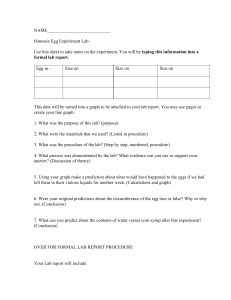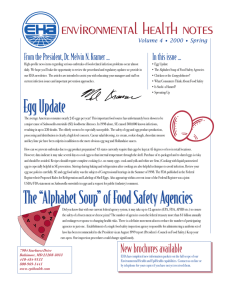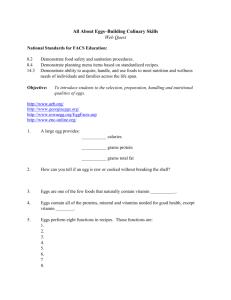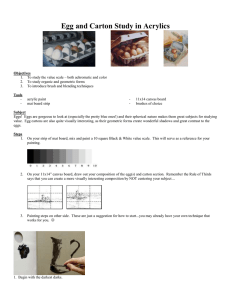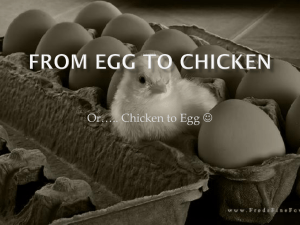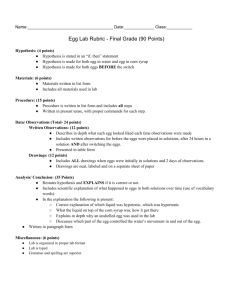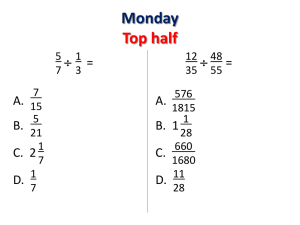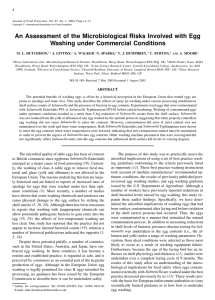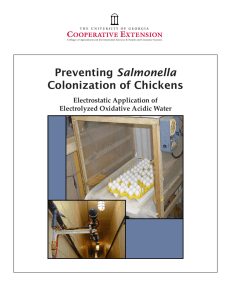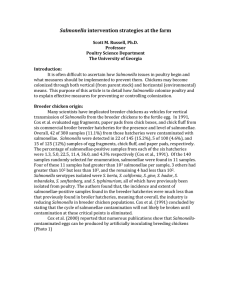File - Paul Perez Portfolio
advertisement
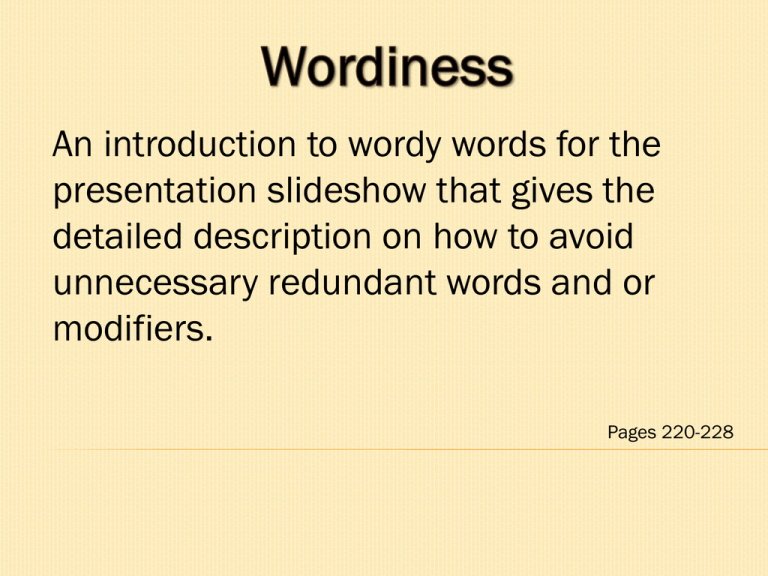
An introduction to wordy words for the presentation slideshow that gives the detailed description on how to avoid unnecessary redundant words and or modifiers. Pages 220-228 ELIMINATING REDUNDANCY Don’t use double words that work in pairs from one another. Don’t use redundant modifiers that repeat all or part of the meaning of other words in a sentence. Your language is redundant when you use words or phrases that unnecessarily repeat towards in the sentence. REDUNDANCY EXAMPLES Double words Redundant: The evil and nasty villain in the black coat knocked the tasty and delicious ice cream out of the crying child's hand. Concise: The devious villain in the black coat knocked the chocolate ice cream out of the crying child's hand. Redundant Modifiers Redundant: A farmer growing pumpkins must be aware of these things. Pumpkins are orange in color, must have a smooth surface in touch, and must weigh about 10-20 pounds in weight. Concise: A farmer growing pumpkins must be aware of these things. Pumpkins are orange, must have a smooth surface, and must weigh about 10-20 pounds. COMMON REDUNDANCY Double Words Advice and counsel Agreeable and satisfactory Any and all Assist and help Basic and fundamental Due and payable Each and every Fair and equitable Fair and reasonable Full and complete Help and benefit Hope and trust Null and void Opinion and belief True and accurate Redundant modifiers Instead of these words…… Absolutely essential Absolutely free Circle around Continue on Decrease down End result Free gift Future plans Mail out Past history Past memories Repeat again Use these concise alternatives Essential Free Circle Continue Decrease Result Gift Plans Mail History Memories repeat ELIMINATING UNNECESSARY WORDS Readers want to read technical documents as quickly as possible. So eliminate any words not necessary to convey your message. For instance, instead of stating “have the ability to,” “have the capability to,” “has the capacity for,” or “has the opportunity to,” state “can.” ELIMINATING EXAMPLES Sample: Wordy: It should be pointed out that there are three candidates whom our organization without further delay will endorse, despite the fact that we are not in a position to contribute any money to their campaigns. Concise: Our organization will now endorse three candidates although we cannot contribute any money to their campaigns. COMMONLY USED PHRASES THAT YOU CAN USUALLY DELETE as a matter of fact I believe I hope in my opinion in other words I should point out that I think it is essential it is evident It is interesting to note that It should be noted that Thanking you in advance The fact that There are There is To the extent that USE SIMPLE WORDS When you want to impress your reader, resist the temptation to use words that you don’t normally use. Words that you rarely use when talking Your readers will prefer words that are more familiar. SIMPLE WORDS EXAMPLES Less-familiar words Pursuant to our conversation on December 15. Your firm’s response purports to explain why you deviated from the grant guidelines. The accounting office will endeavor to procure our compensation checks. Simple, familiar words As we discussed on December 15. Your firm attempts to explain why you deviated from the grant guidelines. The accounting office will try to find our paychecks. COMMONLY USED “FANCY” WORDS “Fancy” words Accumulate Apparent Ascertain Cognizant Commence Commitment Deem Endeavor Facilitate Herewith is Indebtedness Initiate Locality Optimum Proceed Procure Pursuant to Subsequent to Sufficient Terminate utilize Simple Words Gather Clear Learn, find out Know Begin, start Promise Consider Try Help, ease Here is Debt Begin Place Best, most Go Buy, get As After, next, later Enough End Use PARAGRAPH Although the average egg looks innocent enough, it can harbor dangerous food borne bacteria. Salmonella enteritis is the bacteria that can invade eggs in several ways. It is not passed hen to hen but usually from rodent droppings to chickens. Egg shells can be contaminated by fecal matter. It comes from the intestines and feces of infected animals including chickens. It can be passed to the egg shell when the chickens sit on the eggs. Salmonellosis (an infection caused by salmonella bacteria) can also be passed to eggs when the ovaries of chickens silently harbor the salmonella bacteria. Then, the eggs are contaminated while inside the chicken, before the shells are even formed. Because of the recent alarm about egg recalls, the public has learned that USDA inspectors don’t check hen houses or look into farms’ salmonella prevention programs, such as inoculation. Recent inspections of egg farms have brought attention to the numerous rodent holes in the chicken farms. Rodent holes are a sign that mice have entered the buildings and infecting hens with salmonella. Eggs are washed and disinfected to deal with the dirt and germs on the shells. Many farmers inoculate the hens, but salmonella contamination in eggs is not prevented entirely by this method. PARAGRAPH EDITED Eggs can harbor dangerous food borne bacteria such as salmonella. Salmonella forms in the intestines and feces of infected animals including chickens. Salmonellosis (an infection caused by salmonella) can contaminate eggs when the egg shell comes in contact with the fecal matter of rodents and chickens. It can also be passed to eggs inside the ovaries of an infected chicken before the shell is formed. The public has been made aware of inspections by the USDA due to recent egg recalls. USDA inspectors do not check hen houses, or the farms’ salmonella prevention programs such as inoculations. Egg inspections have brought attention to numerous rodent holes on the farms. Farmers prevent most contamination by washing and disinfecting eggs, as well as inoculating the hens. SOURCE Sims, Brenda. Technical Communications. Kendall Hunt publishing company, 220-228. Print.
